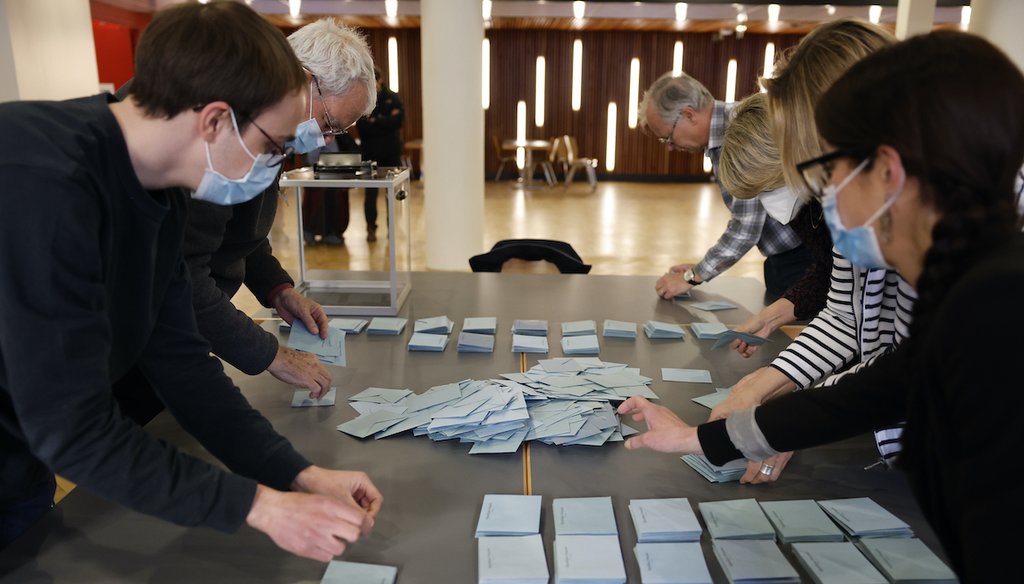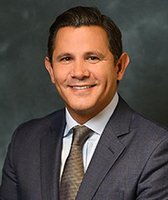Stand up for the facts!
Our only agenda is to publish the truth so you can be an informed participant in democracy.
We need your help.
I would like to contribute

Voting station volunteers count ballots box in the first round of the French presidential election, in Strasbourg, eastern France, Sunday, April 10, 2022. (AP)
If Your Time is short
-
France held the first round of voting for president on April 10. President Emmanuel Macron and Marine Le Pen, the top two vote getters, advanced to the April 24 runoff. Initial results were known that evening.
-
In France, after the last polls close at 8 p.m., initial projected results are posted and then updated throughout the night. These initial results historically have proven to be correct.
-
France gets faster election results for a variety of reasons, including that French elections are run by the national government and fewer elected offices are on the ballot.
In November 2020, it took days for key states in the U.S. to count ballots and report preliminary results to project a winner in the presidential race. But that’s not the case in France, said Ohio Senate candidate J.D. Vance.
"I have a buddy in France, and they just had an election there," Vance tweeted April 10, drawing tens of thousands of reactions. "Polls closed a few hours ago and they already know who the winners are. Must be nice to live in a first world country."
Vance didn’t directly compare the counting of results in France and the U.S., but many who viewed his tweet read it that way. Vance is one of many Republicans running in the May 3 primary in Ohio with hopes of replacing Sen. Rob Portman who is retiring.
We were curious about Vance’s comments and the differences between U.S. and French elections.
In France, the first results were quickly posted on election night, which was April 10. Since no candidate received more than 50% of votes cast, the top two vote-getters, President Emmanuel Macron and far-right candidate Marine Le Pen, will compete in a runoff on April 24.
The initial numbers were projected results, but they did end up being correct in predicting who would move on to the second round. But experts told us that it’s not so simple to compare France, and the U.S. because there are key differences in how their elections are administered.
Almost all French voters cast ballots in person on Election Day. Its overseas territories started voting on Saturday, April 9, while voters in France went to designated polling stations on Sunday, April 10. (Voters can designate someone to cast a ballot on their behalf by proxy.)
Most of the polling stations closed at 7 p.m., while some in larger cities such as Paris closed at 8 p.m.
Immediately after the closing of the polling stations, the ballots were counted manually at each polling station, said Pascal Confavreux, spokesperson for the Embassy of France in the U.S.
The results were announced in each polling station, usually one or two hours after the closing time, and transmitted to the Ministry of Interior, which published the results in real time.
The first results were made public at 8 p.m. local time. These results were a combination of polling station surveys and the very first provisional results published by the Ministry of Interior. They were updated in the minutes and hours to follow.
"In all cases, the estimation given at 8 p.m. always gives the right winner, and the estimate only changes marginally after it is checked," said Vincent Martigny, a political science professor at University of Nice.
But those weren’t the final results, said Erwan Lagadec, a professor at the Institute for European, Russian, and Eurasian Studies at George Washington University. For instance, the score of the candidate who ultimately came in third place, Jean-Luc Melenchon, crept up all night.
"Since the only fact that matters in the first round is who the top two candidates are, it's typically easier to make a solid projection early on," Lagadec said.
The Ministry of Interior published the day after, in the afternoon, the consolidated results taking into account all the results from France, French territories overseas and the French people living abroad, Confavreux said. The Constitutional Council announced on April 13 that Macron and Le Pen were the official winners and will advance to the runoff.
The council also ensures that the election was properly conducted and examines any complaints.
Elections experts noted several differences between how France and the U.S. elect presidents which play a role in the reporting of results:
In France, the election was a single contest. Voters selected a candidate card and stuffed it in an envelope. Those cards were then placed into piles for each candidate and counted. "It’s certainly easier than the U.S., where there are often many more races you are dealing with," said David Levine, elections integrity fellow at the Alliance for Securing Democracy at the German Marshall Fund.
Elections in France are centralized. This means the rules for the election are the same no matter where you live, although there are slight variations in when the polls close. The Ministry of the Interior makes technical preparations for elections and develops and distributes ballots. This is very different from the U.S., where elections are decentralized. Counties and municipalities in the U.S. administer elections based on 50 state laws and then report results to states which then certify results and pass them along to Congress.
A single time zone and fewer votes can speed up the process. France only has one time zone, while the U.S. has six time zones (four main ones.) About 35 million French cast ballots, while about 158 million Americans voted in the general presidential election.
France doesn’t have an Electoral College. "They know when they've got somebody up ahead and winning and has a decent chance. That’s not necessarily the case here," Levine said. In the U.S., it can take several days for states to count ballots until a candidate is projected to have reached the 270 electoral count threshold.
France does not have voting by mail, except for a very small sliver of people who are in pre-trial detention or in jail, Levine said. In the U.S., it takes several days to go through the process dictated by state laws to receive, verify and count millions of mail ballots. Under varying state laws, voters often have a certain number of days to correct defects on their mail ballot, such as if they forgot to sign the return envelope.
RELATED: The race for the Ohio U.S. Senate seat: A guide
RELATED: All of our fact-checks about elections
Our Sources
J.D. Vance, Tweet, April 10, 2022
Ministry of the Interior, First round French presidential election results, April 10, 2024
France24, Explainer: What you need to know about France’s presidential election, April 9, 2022
The Local, How do the French produce such accurate early election results? April 7, 2022
Atlantic Council Europe Center, Twitter thread on elections in France, April 8, 2022
ABC 15 data/political analyst Garrett Archer, Tweet, April 11, 2022
New York Times, Macron to Face Le Pen for President as French Gravitate Toward Extremes, April 10, 2022
Office for Democratic Institutions and Human Rights, France presidential election, April 2022
Constitutional Council, Press release, April 13, 2022
PolitiFact, Prepare for the weirdest election 'night' ever, Sept. 1, 2020
Telephone interview, David Levine, elections integrity fellow at the Alliance Securing Democracy at the German Marshall Fund of the U.S., April 12, 2022
Email interview, Erwan Lagadec, professor at the Institute for European, Russian, and Eurasian Studies at George Washington University, April 11, 2022
Telephone interview, Marie Jourdain, visiting fellow at the Atlantic Council’s Europe Center, April 12, 2022
Email interview, Nonna Mayer, CNRS Research Director Emerita at the Centre for European Studies and Comparative Politics of Sciences Po, April 11, 2022
Email interview, Vincent Martigny, political science professor at University of Nice, April 11, 2022
Email interview, Pascal Confavreux, spokesperson for the Embassy of France in the U.S., April 12, 2022
































